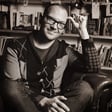
Episode 486: Cartooning is the Children’s Table of Art, says Roz Chast
"I really love this medium. I think cartooning is an incredible medium. There aren't a lot of rules. You can, if you can, really make it up. You can make it suit you," says Roz Chast a cartoonist and artist whose work routinely appears in The New Yorker.
So today we have Roz Chast. You know Roz Chast, and if you don’t, quite frankly I hope we never meet. She’s a long time cartoonist for The New Yorker whose work is kinda of panicky and bleak and goofy and … heightened … and wicked smaht. She’s the author of Can’t We Talk About Something More Pleasant?, Going into Town, and What I Hate from A to Z and what brought Roz to the podcast is a two 1,000-piece puzzles and a 2026 wall calendar now out by Workman Publishing. Really cool, and you can find those at hachettebookgroup.com.
Cool stuff.
Roz was, of course, a joy to speak with. I watched several interviews with her in preparation for this and I reached out to Dana Jeri Maier for questions because Dana loves Roz, and is a working cartoonist, so it seemed like a good shoulder to tap.
Roz is a true artist. She paints these pysanka eggs, which are dyed eggs with cool paintings on them. She’s into block printing now and she does some rug weaving things, too. I’m sure there’s a formal term for it. She was inducted into the Society of Illustrators Hall of Fame in 2019. She won the National Book Critics’ Circle award for Autobiography in 2014, and also was a National Book Award finalist for Can’t We Talk About Something More Pleasant? Her work routinely appears in The New Yorker and in this episode we talk about:
- The ricketyness of a freelance career
- How being an outsider made her a better cartoonist
- How cartooning is like being at the children’s table of art
- Aging parents
- And her experience on The Simpsons.
Lots of rich stuff here that I hope you enjoy. I know I did.
Newsletter: Rage Against the Algorithm
Show notes: brendanomeara.com



















